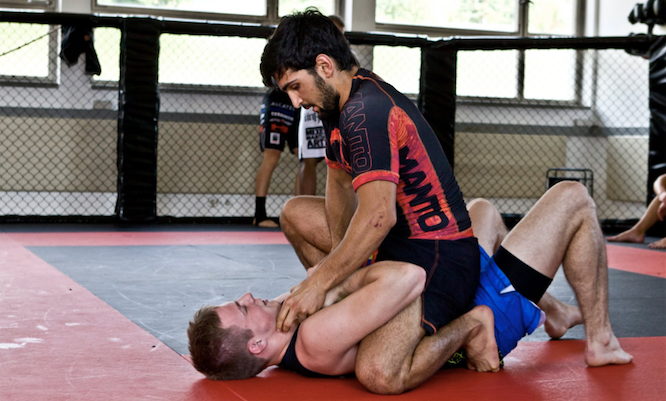Athletes need physical conditioning. Its one of the most trained physical abilities.
What is conditioning?
Conditioning is the ability to repeat a certain effort with minimal fatigue.
Classic examples are team sports like Soccer, American Football, Basketball, Ice hockey and all combat sports. In those sports it is crucial to keep fatigue between the first and the last sprint/effort (and all the others in between) as minimal as possible.
First, conditioning needs to be differentiated from endurance as explained in my Endurance vs. Conditioning – the biggest misconception in Training for Sports article. Conditioning is what most athletes need, not endurance.
Improving condition and achieving peak condition is the goal of conditioning workouts and most training in general. Reaching peak condition is something done fairly fast - depending on the sports this usually takes only a few months. But maintaining peak condition is only possible for a fairly short amount of time. Depending on the sports this is usually a few weeks a year. Depending on the sport there might even be just one or two days a year where you need to be in peak condition. Which are the main competitions of the year. Being in peak condition far away from a major competition is a waste of energy and resources, increases injury risk without much benefit gained and decreases the odds of being in peak condition when it actually matters.
How to reach peak condition is done through careful planning by using structured periodization. Which in sports is mainly achieved by adjusting and manipulating training volume.
On the way to achieve peak condition there are 2 things that I know for sure:
1. There are two main reasons someone is not conditioned. Not one.
You have not done your sport for 4+ weeks. You come back and in the first workout or game you are gassed half way through. Basically every athlete has experienced that. Its a classic case of not being in shape which is not being conditioning based on the reason you didn't do enough. In the case of a break you actually did nothing at all. So: no training = no conditioning. That's the one reason every body knows. The second reason is not as obvious. Its: too much training = no top conditioning. Being overtrained and overworked is an easy way to lose conditioning. In weight training a classic case would be training 2-3h a day to the point where you lose strength. Losing strength is deconditioning. In sports this happens a lot in younger and super motivated athletes and a lot in all fight sports. Training more only works to a certain point. Training so much that you get tired is part of training, its not the goal of training, though. The goal of training is to progress in training, to get better. You can only train so much without blowing out. Without getting de-conditioned and in the worst case injured, by doing too much. For example in track & field they have figured that out a while ago, where elite long jumpers actually do less than 100 full jumps in the sand pit per year and 100m sprinters know they have less than a hand full of full races at top speed before they blow out. Same goes for every other sport. Too much de-conditions as too little de-conditions. If you work with an athlete with a very high level of body consciousness and not that much drive that she or he believes more is better all the time, listening to the athlete is a great way to adjust training volume. As these traits aren't as common as one would think adjusting training volume based in simple periodization and markers such as training loads, sleep quality, drive, speed of movement, quality of movement, grip strength, heart rate and neurochemistry are much more reliable and objective. More is not better. Better is better. Adjust volume and periodize training to achieve peak condition when its needed.
2. Conditioning is specific to the sport.
Every lecture I do on conditioning I start with the same example. Lance Armstrong, 7time Tour de France Winner, the greatest cyclist of all time and one of – if not – the best endurance athlete(s) in history, runs a marathon in 2:53h. A time that sounds good for an amateur. Technically though its nowhere near world class. It does not even place him in the top 10,000 of the world's best marathon runners in a single year. How can the best cyclist of all time be this bad at running? Because fitness and conditioning are specific. And the further two disciplines are apart the less carryover you have. You are a fighter and you do some sprints for general conditioning. Will that help you? yes Because managing distance during a fight is basically short sprints. On the other hand, an ice hockey player will benefit from sprints in the offseason. How much does skating have in common with sprinting? Not much. Even worse, with the slightly forward posture hockey players have skating and the resulting tension in the hip flexors and hamstrings the odds of tears and pulls in sprinting are way too high. I have seen this before, hockey players hurt themselves sprinting and therefore wasting half of their offseason is not smart. Want to get conditioned for the season. Play some hockey in the weeks before the camp. And be ready for the preseason camp. Focus on what really holds you back during the majority of the offseason. Which are strength, functional hypertrophy and flexibility in most athletes, such as ice hockey. And then condition with what you need to be conditioned in. You run, then run. You cycle, then cycle. You fight, then spar. You play, then play. Conditioning is specific to the task. There is some place and time for general conditioning. And the end its the specific conditioning that will make the difference, though. Focus on what makes the difference. When its time to make that difference.
In summary, conditioning is important. To get the most of it adjust training volume. Take a break when you are tired. Peak when you need peak condition. And condition with what you need to be condition in. To get the most out of your conditioning and training.
All the best for adjusting your conditioning workouts based on these two factors!
Trainers and coaches need to start to respect interval training. And trainers and coaches need to start to program and periodize interval training much better. This is why I have designed the YPSI Interval Training Program Design & Periodization Seminar , which will be held for the first time in english on February 23th/24th in Hasselt, Belgium.
More articles from the "2 Things I know for sure about..." series:
2 Things I Know For Sure About the Periodization
2 Things I Know For Sure About the Incline Press
2 Things I Know For Sure About Squats
2 Things I Know For Sure About Training
2 Things I Know For Sure About Nutrition
Picture: The latest addition to the YPSI Team upcoming YPSI Coach Mert Özyildirim during MMA practice which conditions him specific to the tasks of the sport. Mert is part of the Planet Eater Team and a Pro MMA Fighter with a record of 5 wins and no losses.

